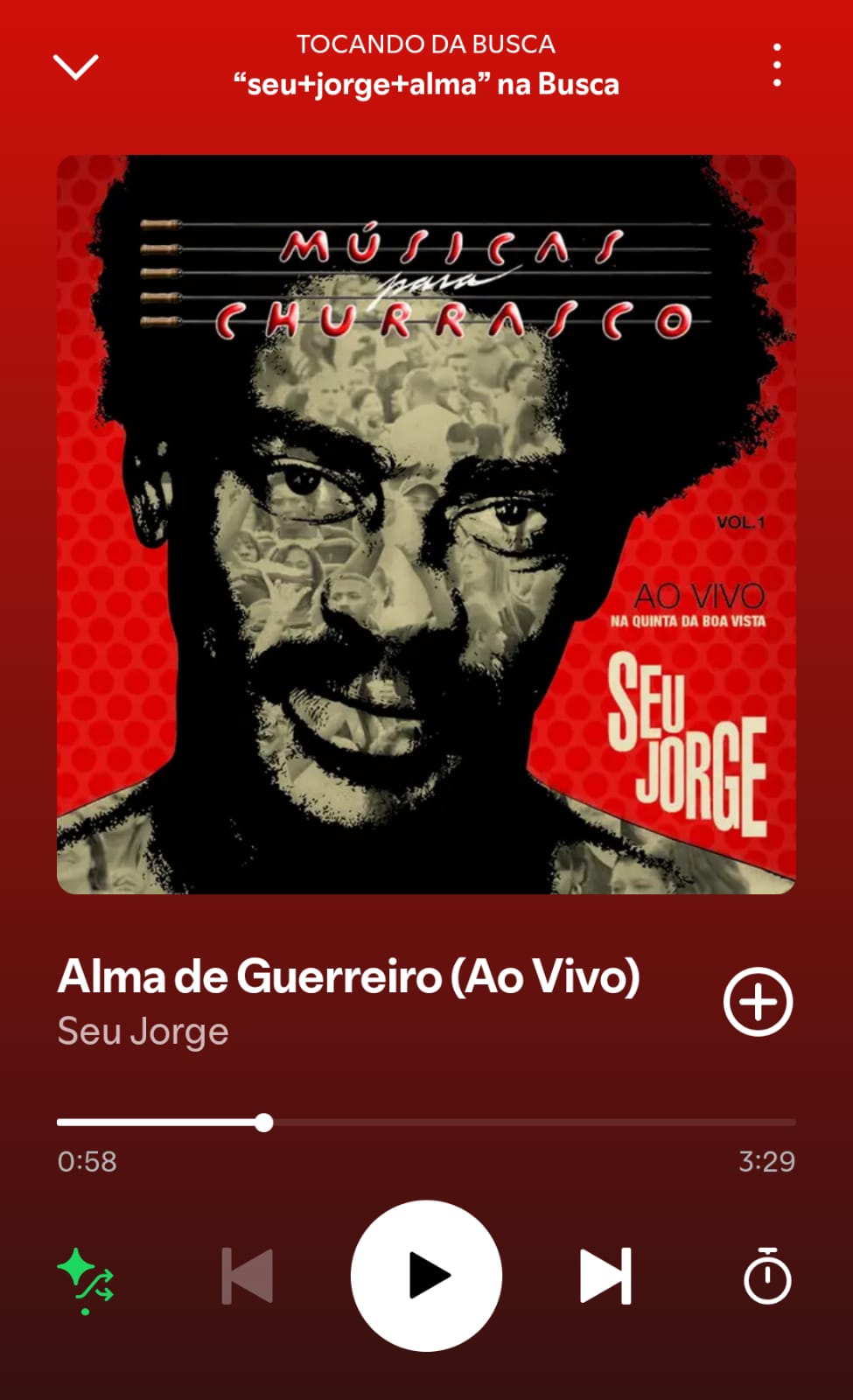I don’t think I have ever listened to this full song despite having listened to bits and pieces because of its popularity here in Brazil. Yet I woke up today with its chorus on repeat in my head. Something about Alma de Guerreiro, by Seu Jorge, has that hypnotic quality that lingers in the back of your mind, even if you don’t know all the lyrics. Maybe it’s the rhythm, maybe it’s the message, or maybe it’s just that unmistakable, soulful voice of Seu Jorge.
Released in 2012 as part of the soundtrack for the Brazilian television series Salve Jorge, Alma de Guerreiro became one of Seu Jorge’s most recognizable songs. The track played a significant role in setting the tone for the show, which became a cultural phenomenon in Brazil and beyond. The song’s empowering lyrics, combined with Seu Jorge’s deep and expressive vocals, perfectly captured the themes of struggle and determination that defined the series’ protagonist.
Although not originally included in a Seu Jorge album, the song’s success cemented its place in his discography as one of his most impactful tracks. The composition carries his signature mix of samba, MPB (Música Popular Brasileira), and a hint of funk, making it both a motivational anthem and a groove-worthy tune.
Who is Seu Jorge
Seu Jorge, born Jorge Mário da Silva, rose from the favelas of Rio de Janeiro to become one of Brazil’s most beloved musicians and actors. Known for blending Brazilian rhythms with contemporary influences, he gained international recognition for his samba-funk style and unique voice.
Before Alma de Guerreiro, Seu Jorge had already made waves in both the music and film industries. He was a member of the band Farofa Carioca, played a memorable role in Cidade de Deus (2002), and became famous for his Portuguese-language David Bowie covers in The Life Aquatic with Steve Zissou (2004).
By the time Avenida Brasil aired, Seu Jorge was already an established artist, but Alma de Guerreiro pushed him even further into the mainstream. The song resonated with audiences because of its powerful message: to keep fighting despite hardships, to embrace one’s warrior spirit, and to never give up.
ON THE “VIDEOCLIP” Brazilian pinacle: soap opera intro
While Alma de Guerreiro did not have a traditional music video, it became visually iconic due to its association with Salve Jorge. The show’s opening sequence featured dramatic images of Rio de Janeiro’s streets, interwoven with football (soccer) imagery, symbolizing resilience and passion.
The connection between the song and the series was so strong that many people still immediately think of Avenida Brasil when they hear the track. The character Jorginho, played by Cauã Reymond, embodied the song’s spirit—a fighter overcoming his past and trying to carve out a better future.
TALK NERDY TO ME: MUSIC THEORY TRIVIA
From a musical perspective, Alma de Guerreiro is a masterclass in Afro-Brazilian rhythmic fusion. The song’s arrangement is heavily influenced by samba and pagode, with its percussive elements giving it an infectious groove.
- Chord Progressions: The song relies on simple yet emotional chord changes, creating a balance between uplifting and introspective tones.
- Rhythm: The syncopation in the percussion brings out the Afro-Brazilian roots of Seu Jorge’s style.
- Vocals: Seu Jorge’s deep, raspy voice adds depth to the lyrics, making them feel even more powerful and heartfelt.
- Instrumentation: The mix of acoustic guitar, percussion, and subtle brass elements enhances the song’s rich texture.
MORE FROM SEU JORGE
If you loved Alma de Guerreiro, here are some other works by Seu Jorge that you should check out:
- Music:
- Burguesinha – A catchy samba-funk anthem that became a massive hit.
- Tive Razão – A smooth, laid-back love song with a groovy bassline.
- Carolina – One of Seu Jorge’s early classics, full of Brazilian swing.
- Videoclips:
- Mina do Condomínio – A fun and playful video featuring Seu Jorge’s storytelling style.
- É Isso Aí (with Ana Carolina) – A touching duet that showcases his emotional depth.
- Movies & Specials:
- Cidade de Deus (2002) – His breakout film role.
- The Life Aquatic with Steve Zissou (2004) – Where he reinterpreted David Bowie’s classics in Portuguese.
- Marighella (2021) – A political thriller directed by Wagner Moura.
Seu Jorge’s influence goes beyond just music—he represents Brazilian culture in all its richness and complexity. Alma de Guerreiro is just one piece of his artistic legacy, but it’s a powerful one that continues to inspire listeners to embrace their inner warrior.





